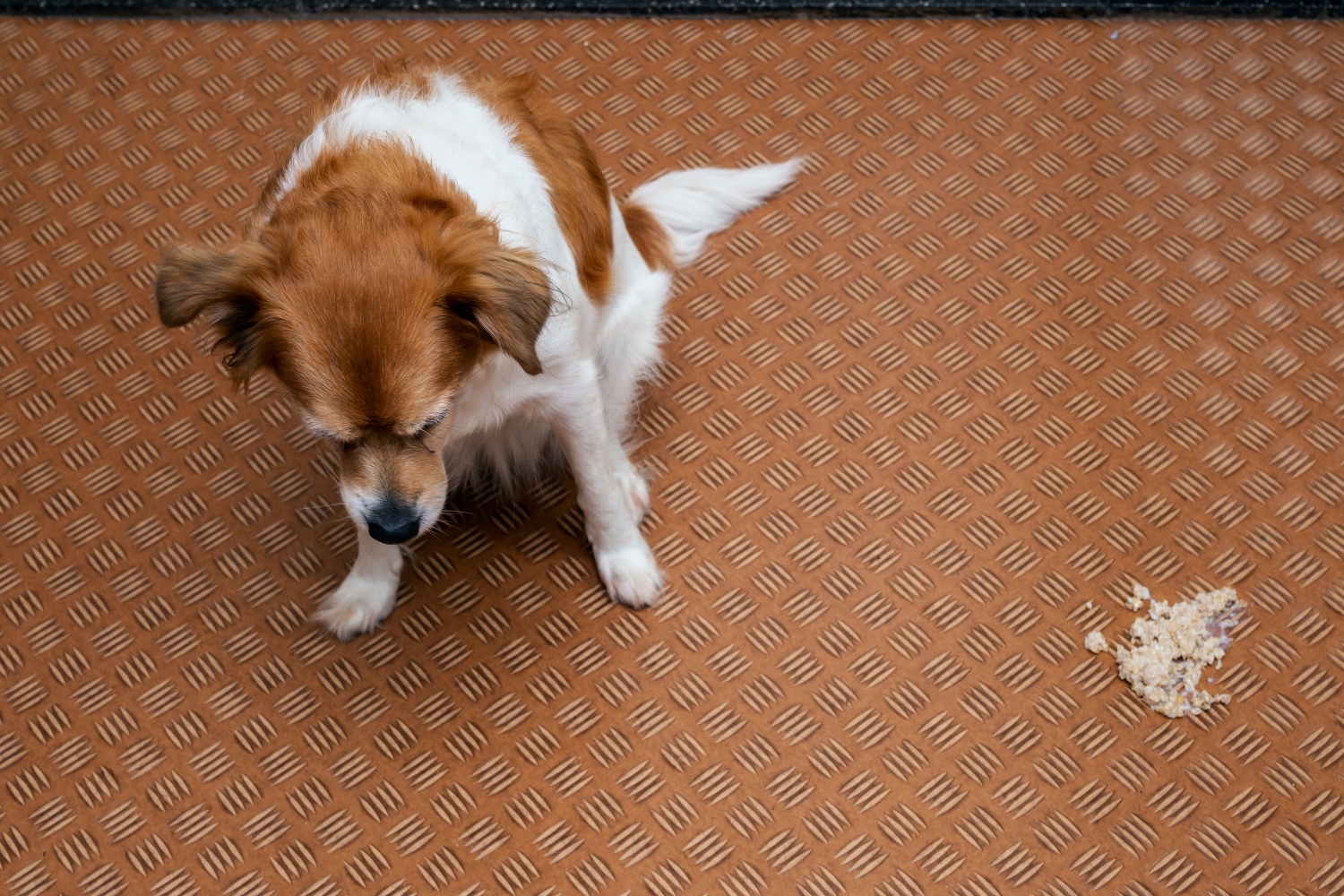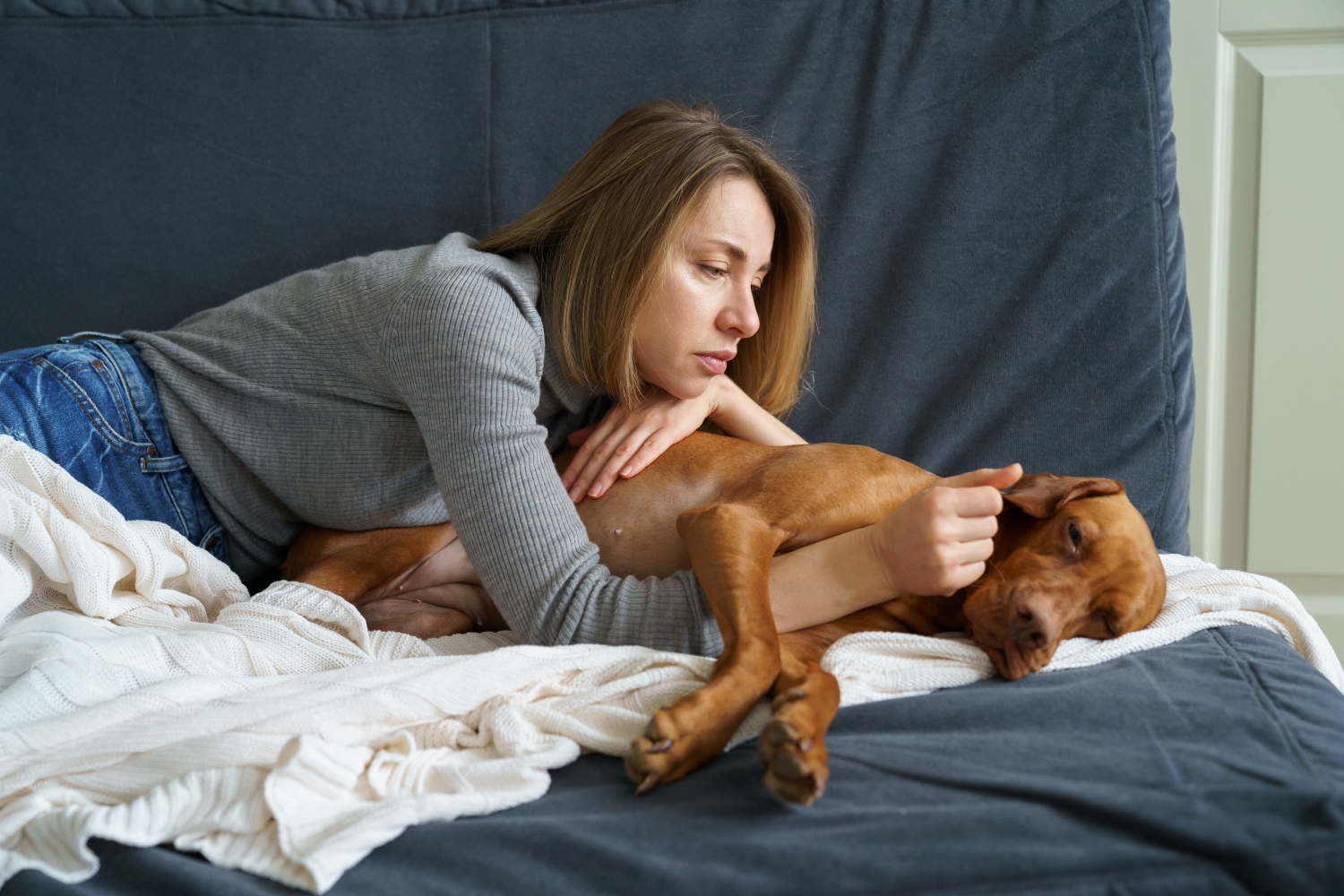
11 things to give a dog with an upset stomach
12th April, 2023
Has your hound got tummy troubles? Here are some quick remedies that could help.
Seeing your beloved pooch suffering with an upset stomach is heart-wrenching for any caring dog owner. Read our Petwise guide to 11 things to give your poorly pooch and get them back on the mend in no time.
As your furry friend gets older, chances are they’ll develop a health condition. Having the right pet insurance for senior dogs means they’ll always get the very best care throughout their life.
Whatever you do, don’t delay arranging pet insurance for senior dogs. Give our caring team at Petwise a call right now, as you never know when it’ll come in handy.
So, how will I spot my dog’s tummy trouble?
If only our dogs could tell us how they’re feeling! An upset stomach is a common enough complaint among canines, but how can we tell when they’re suffering and need our help?
Symptoms of an upset stomach in dogs can be subtle and can range from mild to severe, meaning it’s important to be aware of the most common signs. The sooner you notice your dog has an issue, the quicker you can get them feeling themselves again.
Here’s a list of some of the most common indicators that your dog may have an upset stomach.
Eating less or refusing food
If your old dog is refusing to eat, what can you do to help? Here are 20 things Petwise advises you to try. Remember, a sudden change in your dog’s weight is always worth investigating with a professional.
Being sick
Irritation of the stomach can lead to nausea and vomiting. Dry retching or heaving can also be a sign of digestive problems.
Diarrhoea
An upset stomach can also lead to diarrhoea. In some cases, there might also be blood or mucus in the faeces. The Blue Cross has lots of useful information on diarrhoea in dogs.
Bloating or abdominal swelling
A bloated stomach can be a sign they’ve eaten too much, but it can also indicate the potentially fatal condition bloat (or gastric dilation volvulus). This can be a common health problem particularly in giant breeds and cats. This must be dealt with as an emergency.
Excessive flatulence
While some farting is obviously to be expected from an old dog, if it becomes excessive then you’ll need to do something about it - for both your sake and theirs!
Constipation
An uncomfortable problem that’s likely to affect most dogs at some point in their lifetime. For more on how to deal with constipation read this useful article from The Kennel Club.
Excessive drooling
If your dog has eaten something that doesn’t agree with them then they may experience some kind of mouth irritation. They might produce lots of saliva or foam at the mouth.
Excessive swallowing or licking
This may be a response to acid reflux.
Painful abdomen
Your dog may find it painful to be picked up and may growl when you touch near their stomach.
Lethargy or lack of energy
A dog who has become tired, listless and weak may be suffering from a painful stomach condition.
Eating grass
A dog may eat grass to soothe their upset stomach or make themselves vomit.
If you notice any of these signs in your dog, it's important to pay close attention and monitor their condition. You should speak to a vet for proper diagnosis and treatment, particularly if symptoms don’t go away or become more severe.
While most mild cases of an upset stomach should improve within one to two days, complications can occur. For example, if your dog has been vomiting or suffering from diarrhoea, they may become even more ill through dehydration.
But you know your dog best. Even if they don’t have the symptoms listed above, if you’re at all concerned then it’s always best to contact your vet. If you have pet insurance for senior dogs through Petwise, you have access to vet video calls 24/7 through Firstvet.
The vet will ask questions to help determine the cause and if any treatment is required. Be ready to answer things like:
- When did the symptoms first start?
- How often has your dog been passing faeces?
- What do the faeces look like? For example, is there blood or mucus in it?
- How is your dog behaving? For example, are they in pain or vomiting?
- Have you made a recent change to their diet or environment?
- Could they have recently eaten something toxic or otherwise indigestible?
They’ll probably also ask about your dog's weight – whether it’s stable, or has dropped recently. Lastly, they may ask you whether there is anything else about their health or general behaviour that is worrying you.
The better your answers, the easier it is for the vet to build up an accurate picture of exactly what's happening and decide on the best course of treatment to help. If you have pet insurance for senior dogs, your policy should be able to help with the costs of any emergency treatments or procedures.
Remember, with pet insurance for senior dogs through Petwise, you can chat with a vet at a time that suits you.
What’s causing my dog’s upset stomach?
There can be many reasons why a dog might have an upset stomach. Some common causes of upset stomach in dogs include:
Overeating or eating too quickly
Gobbling food can lead to bloating and an upset stomach. If a dog gulps their food down too quickly, they can swallow air at the same time which can cause their stomach to expand and become upset.
Exercising straight after eating food
Going for walkies straight after dinner is a big no no. Not leaving adequate time for food to digest can cause indigestion and discomfort.
Eating something indigestible or toxic
Whether it’s human food, rubbish, faeces, plants, or other foreign objects, sometimes you can’t stop a dog chowing down on something they shouldn’t. This can easily cause an upset stomach. If you want to know more about what foods your dog can and can’t eat then read this recent Petwise A to Z guide.
Gut blockage
Bones, socks, underwear, children’s toys, dummies and bouncy balls are just some of the things that have been retrieved from inside our furry friends.
Stress or anxiety
Dogs are creatures of habit and any change in their routine or home environment can cause them stress, which in turn can lead to tummy problems. A dog's stomach is very influenced by how they’re feeling, so separation anxiety, lifestyle changes, or environmental stressors can all cause issues.
Food allergies or sensitivities
Some dogs may have allergies or sensitivities to certain ingredients in their food.
A sudden change to their diet
A change in diet can cause an upset stomach in dogs. If you’ve got a recent puppy addition to the household and are wondering whether you can feed an older dog puppy food, then read this Petwise article before you do.
Infections or parasites
Viral infections such as parvovirus and bacterial gut infections can cause an upset stomach in dogs. As can parasites such as worms or giardia.
Antibiotics

While antibiotics are an invaluable part of a vet’s treatment armoury, they can often cause sickness and diarrhoea. If your dog suffers from either while being treated with antibiotics, you’ll need to speak to your vet as your dog may not be keeping their medication down.
Other drugs
Many prescribed medications need to be given with food. If served on an empty stomach, your dog might reject them.
Pre-existing medical conditions
Certain medical conditions, such as gastroenteritis, stomach ulcers, inflammatory bowel disease or pancreatitis, can cause an upset stomach in dogs.
As dogs age, many will have a pre-existing medical condition, which can make it difficult to find pet insurance for senior dogs. Even if the condition is asymptomatic and well managed it might be impossible to secure cover for your faithful friend, and at a time when vet treatment could cost thousands of pounds.
A key benefit of arranging pet insurance for senior dogs through Petwise is that pre-existing conditions are covered, as long as it was asymptomatic for at least two years prior to taking out the policy.
For more on what pet insurance for senior dogs covers read this article from the team at Petwise. It takes an in-depth look at the common health problems older dogs can develop as well as what older dog insurance covers, and how to go about choosing the right policy for you.
11 foods to give your dog when they have an upset stomach
All of these are easy-to-digest and sure to be gentle on your furry friend's digestive tract – the secret is to keep things as bland as possible, so keep away from anything rich or fatty and never add seasonings.
If your dog has an upset stomach, keep them well hydrated and only feed them very small meals throughout the day. This will keep their digestive system moving without overwhelming it.
-
White rice
Cooked white rice is easily digestible and contains soluble fibre that absorbs water passing through the digestive tract. As with all these foods, never add salt or sugar and serve the food at room temperature.
Be aware, if your dog suffers with diabetes then rice must be kept off the menu unless advised by your vet. For more on how to spot the signs of diabetes in older dogs read this helpful article elsewhere on our blog.
-
Boiled chicken
This bland meal can help to settle your dog's stomach and provide much-needed nutrients in an easily digestible form. Remove any bones or skin from the chicken before giving it to your dog.
It can be shredded into small pieces and is often mixed with plain boiled rice. Bursting with essential vitamins, minerals, fats, and amino acids, it’s a tasty snack for hounds feeling under the weather.
-
Plain, cooked, lean minced meat
Like chicken and turkey, this can provide some nutrients in a form that is easy for a dog with an upset stomach to digest. Again, boiling is the best method of preparation to avoid the addition of extra fats or oils.
-
Pumpkin
Boiled pumpkin is a natural source of fibre, offers instant energy to your dog and can help to stop diarrhoea. You can give your dog canned pumpkin or even puree your own.
Cooked, peeled, unsalted, and unseasoned pumpkin contains vitamins A, B6, and C, thiamin, niacin, folate, iron, magnesium, phosphorus, riboflavin, potassium, copper, and manganese. A fantastic nutritional boost along with a little digestive help.
-
Boiled, mashed carrots
Softened carrots should bring your old canine some relief. Mashed or boiled, they’re an excellent source of vitamin A, C and K, potassium and fibre.
-
Mashed sweet potato
Sweet potato is another great option packed with nutrients such as vitamins A, C, B6 and B5, manganese and potassium. Like the other natural remedies of carrots and pumpkin, they are also high in fibre.
Three things to remember though – 1. Never serve them raw. 2 Make sure they’re thoroughly cooked. 3 Remove the skin first!
Always let mashed sweet potatoes, carrots, or other foods cool before giving them to your dog. As with white rice, if your dog suffers from diabetes then check with your vet before feeding them sweet potato.
-
Boiled egg
Cooked eggs are full of nutrients, contain plenty of protein and vitamins and are yet another easy option that won't require a special trip to the supermarket. As always, the key is to keep them bland - so, simply boil the eggs and mash them up.
-
Oatmeal
Oatmeal is another great source of fibre and can help with any digestive issues. Just be sure to cook the oatmeal plain, without any added sugar or spices, and check it’s been cooked thoroughly as raw or half-cooked oatmeal can make the situation worse.
Bland and easily digestible, oatmeal can work wonders at soothing an upset stomach.
-
Vet-approved probiotics
Vet-approved probiotics help increase the levels of ‘good’ bacteria in your dog’s gut and help stop ‘bad’ bacteria from overgrowing. They often come in a powder form that can be simply mixed with food.
Yoghurt is a good source of probiotics, which can help to restore the balance of good bacteria in your dog's gut and soothe their upset stomach. Just make sure it’s plain, unsweetened yoghurt and only feed them small amounts - the pet food experts at Purina have more information on feeding yoghurt to dogs.
-
Banana
A low-acidity fruit like banana can help with an upset stomach, too. Including some mashed or sliced banana in your canine’s diet will provide them with a good source of vitamin C and potassium.
It's important to note that these are just temporary measures and it's always best to consult with a vet if your dog's upset stomach persists. Leaving it too long might see you claiming on your pet insurance for older dogs.
-
Bone broth
Bone broth is a mild, liquid meal that is gentle on a dog’s upset stomach. It’s nutritious, delicious and a great way to add moisture and flavour to their food. It’s also a great way to encourage dogs with reduced appetites to eat.
While bone broth is full of healthy goodness, cooked bones themselves are incredibly dangerous for dogs. Use a strainer to remove any sharp bone pieces from your broth before serving.
The dog loving gang over at Rover have a recipe for an easy instant pot bone broth suitable for dogs. Sounds yummy!
The American Kennel Club advises that you only feed these meals once you’ve ruled out other health risks and spoken to your vet. And remember, dogs with existing health conditions like diabetes, cancer, allergies, and senior dogs might need additional nutrition to stay healthy.
If you own a senior dog, it’s good to know there’s dietary help when you need it. Petwise pet insurance for senior dogs can include a senior food contribution. We really have thought of everything!
How to care for your dog if they’ve been sick
Vomiting is a common symptom of an upset stomach, but when you see your dog suffering it can be difficult to know the right thing to do. Follow these tips to help them feel better:
- Don’t let them eat or drink for at least an hour. This will give your dog's stomach a chance to rest and recover.
- After an hour, offer small amounts of water. If your dog is able to drink the water without vomiting, you can slowly increase the amount.
- Watch out for dehydration. Signs of dehydration include loss of appetite, lethargy, sunken eyes, dry gums, and lack of skin elasticity.
- Let your dog rest and recover and avoid anything energetic until they’re feeling better.
- It's important to monitor your dog closely. Contact your vet immediately if your dog continues to vomit, they’re unable to keep water down, or if they are showing other signs of illness such as lethargy and diarrhoea.
The vet may recommend withholding food and water for a longer period of time or prescribe anti-sickness medication or antibiotics.
If the problem continues then a vet may also run further tests to check for other health problems. These checks could include an analysis of faeces, blood tests, x-rays and ultrasound scans – you’ll certainly want the right pet insurance to deal with the costs of these.
Find pet insurance for senior dogs at Petwise

We know that senior dogs can still bring their owners many wonderful years of companionship and joy and deserve to be well protected.
We specialise in pet insurance for senior dogs aged seven and over, with a range of benefits designed for owners of older pets.
Get a quick quote for pet insurance for senior dogs today.